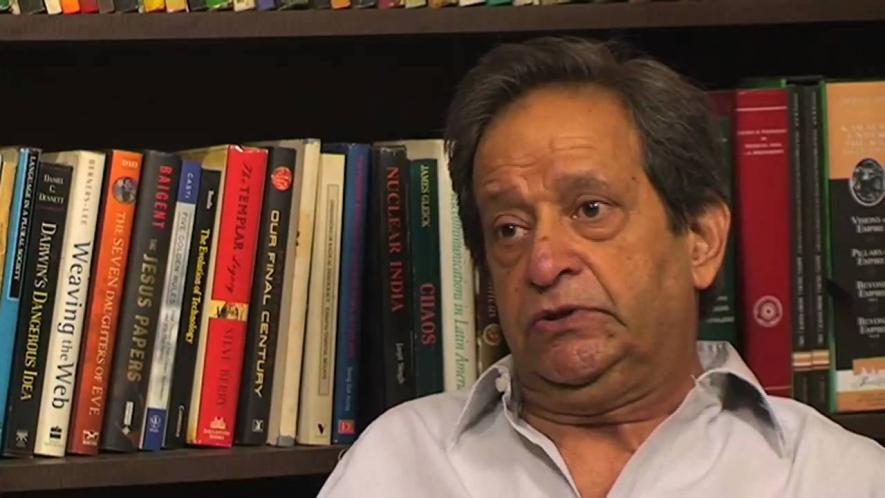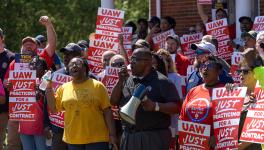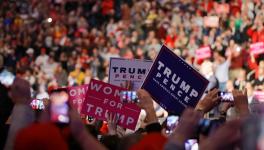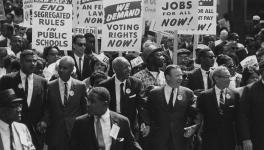‘The Most Authoritarian Thing in the World is Capital,’ says Prof. Aijaz Ahmad

Prof. Aijaz Ahmad
The murder of George Floyd in Minneapolis triggered a series of protests in the US, and across the world. Despite a deadly virus waiting in the wings, a killing has resulted in thousands taking to the street. In this interview with Vijay Prashad, the Executive Director of Tricontinental: Institute for Social Research, Professor Aijaz Ahmad, one of the foremost Marxist intellectuals, elaborates on why the capitalist structure is struggling to cope with the nature of these protests, and on how its systems, designed to punish into obedience, look helpless at the moment. The following is an edited transcript of the interview:
Vijay Prashad: Well, the world seems to be on fire after the terrible death of George Floyd in Minneapolis. There have been protests, not only within the United States, but also around the world, as people are really outraged by what they are seeing. Could you reflect a little bit on the death of Mr. George Floyd, and the level of unrest about the role of the police in American society?
Aijaz Ahmad: One thing that occurs to me is, of course it has been boiling. American police is in the habit of killing one black person per week on an average – typically, a man, but they also have killed women; and that has just been building up. Ferguson was the earlier episode where there was a very large uprising. All that gave rise to the organisation Black Lives Matter. So, one of the things is that it has been building up more recently.
Second, these are cyclical things that happen in America. When I was living here in the 70s there was the same sort of thing – extreme police brutality – sometimes covertly it would be staged as a non-police or [inaudible] so on.
And great protests around that and so on. So, part of it is that it is cyclical.
The third thing that seems to me is, and that is where the difficulty, I think, is in comprehending, that everyone talks about white supremacy as if it were something pathological out there from which x number of people suffer. Joe Biden just said 13% to 15% of Americans are bad people, whatever that means. You know, as if it is out there.
Now, white supremacy is second skin [inaudible] in racial societies. And a lot of the police are white supremacists running around with guns.
Finally, in order for them to do the kind of controlling of populations that they are required to do, they are also given a great deal of protection. They can get away with anything, and they expect that it is their right.
One of the very significant events, in my view, that just happened, is there is a video – there is an older man, who is an old activist – a white man, who must have been known to the police because he is an old man, and he has been doing this in Buffalo for between 30 to 40 years. He must be well-known. In the video, the two policemen push him. He falls down and hits his head somewhere. After much reluctance, the police department takes action against those two, and 57 of [their] colleagues resign from duty in solidarity with those two men, who had been seen doing this on video.
So, this is a kind of privilege that the police has, and has been given, which is just part of routine American life. And those policemen are now very surprised why something is happening to them now. I have a picture from Long Beach, not very far away from where I am sitting, where there is a black man standing, his little daughter is sitting on his shoulders – she is that small, she is sitting on his shoulders – and there is a white policeman, with a gun aimed at that child, hardly a foot away. And it’s out in the open. It’s in the middle of a demonstration, and by now they know that someone or the other will take a picture, or a video.
So, there’s a kind of impunity granted to the police forces in this country and in most countries, which itself needs to be scrutinised as part of how capitalist societies actually function. In America, you’re now at a particularly delicate moment because you have a President whose work is incitement – incitement of violence, incitement of these “good men” who took over, you know, these white supremacists and so on and so forth – who is deploying the Army in the Capital, in Washington DC, against peaceful demonstrations, with the Head of the [Joint Chiefs of Staff] with him. So, I have seen the United States in the early 70s during the Vietnam War Movement, when there were immensely larger gatherings, but this kind of display of military power that he is staging, this kind of open incitement to white supremacists, to white militias and so on, is a first. So, it is also a particular moment in the United States which is making it much worse. And the more he inflames the situation, the more people are upset.
People are also very upset because they have no way left in America, at this moment, to register their protests, for they can’t look to the Democratic Party to represent them. So these are the unrepresented, unrepresented in the belly of this so-called democratic society who are not represented by anybody. So you know, all of this is boiling over in this country.
Vijay Prashad: I want to pick up on the point you made earlier, which is about the role of the police in a capitalist society. You had mentioned that there is a specific responsibility that the police has, in a society where private property is one of the most inviolable laws, is the defence of private property and so on. The United States is a very particular kind of capitalist society, because it ends up incarcerating the highest percentage of people on the planet. Frankly, I can't tell the difference between a regular police officer and a military fellow. They all seem to look the same now...
Aijaz Ahmad: Certainly, certainly.
Vijay Prashad: I wonder if you could reflect a little bit on, perhaps, the role of the police in a capitalist society.
Aijaz Ahmad: You see, I'll come to capitalist societies in general. But about the United States, let me say this. In the United States, there is a very particular kind of ideology of always being at the frontier, the conquest of the frontier, the masculinity tied up to your gun, the possession of the gun. So, it's a society in which it is not only incarceration; the number of homicides in this country runs into thousands. I don't remember the exact figure from every year, but it is high as compared to the numbers from Canada next door.
So the use of the gun to settle disputes, even of a very private nature, is fairly common in the United states. That gets even more exaggerated when you have a police force which, as I was saying, is given that impunity because they need to get a certain work of law and order done. Democratic society! (laughs). Firstly, I’m not quite sure what we mean by a democratic society. There is a sort of a classification. If you have elections of the sort that you have in India and the United States, somehow, you are a democratic society. I don't understand what that means. India is supposed to be the world's largest democracy and so on, and you have millions of working-class people thrown out of their cities, wandering around, dying on railway tracks... The great democracy carries on, and nobody is punished for any of this. Nothing happens to the government or any ministers or bureaucrats or anyone. So I don't know what kind... But let me simply reflect now on the question of capitalism, why capitalism needs this. [Louis] Althusser has a wonderful article, a wonderful long piece which has now come out as a book, on the ideological state apparatuses, in which he makes the point that capitalist economy could not reproduce itself even for a year, if it was left purely to economic logic. Around that economic logic, you have to have structures of force, you have to have ideologies; you have to have ideologies that justify those structures of force, and those structures of force are built into daily life, in which the state actually controls everything you do.
If you drive over a certain limit, the police can come and do anything to you; if you are white they treat you one way – if you are black, in another way.
So, all your life is actually regulated. If you are 15 days late in filing your taxes, if you forget to file it – a 20 dollar payment you got from somewhere or a 100 dollar payment, you are fined. These societies are full of disciplinary action. In order for a capitalist society, a class society, to function at all with the kind of efficiency that is required in the peaceful way in which you are supposed to be functioning, your daily life itself has to be enveloped in structures of discipline, punishment, uncertainty – just what will happen to you etc. And, habits of obedience.
Class structures cannot be reproduced without beating people into habits of obedience. The most authoritarian thing in the world is capital. This business of democratic societies and authoritarian societies and so on and so forth. These are nomenclatures of a very different sort... The most authoritarian thing is, when you have a situation everyone where can see that this virus – the coronavirus – has led to a tremendous economic upheaval in the United States, which has led to 46.2 million people applying for unemployment [benefits], the government refusing to extend unemployment benefits. Thirty five million people have lost their health insurance or are going to lose their health insurance in a month or so. When all of this is happening and at the same time the government transfers some trillion dollars to the top 0.1%, then how do you control popular rage?
How do you control complete disorder in society, except through demonstration in daily lives, over days and weeks and months and years and lifetimes, of what can happen to you?
Right now, I think Trump’s rhetoric of ‘throw them in for 10 years...do this...’ to show off the military, saying “if the governors and the city governments cannot control it, I will control it through the military” etc. I think, behind a number of other things which are personal to Trump, there is a terrible fear that this great uprising on the question of race can turn into a great uprising, and a much more lasting uprising on the question of the suffering of one-third of the workforce of the United States. That is what the fear is. It is in order to pre-empt that, that you need to come down as hard as you can on this uprising, which is on the [inaudible] question. It’s just a great anger about the killing of black people in this country, which is something that happens in this country all the time. So, it’s a particular moment of anger. They’re hoping that this will pass, and that it will not turn into something.
So, in all these capitalist societies, it is the fear of disobedience. It is the fear that the exploited may rise, and so on. As a result, there is this terror and state repression. I mean, police is only one part of it. In fact, there are about a dozen [agencies] or so, the state apparatuses of paramilitary and military kinds, agencies which are connected both to the Department of Justice and the Department of Defense, which are now in action. And there are now lawsuits asking the government to specify which of the government agencies are now out and deployed. You now people in uniform deployed without any insignia of which agency they are from.
Actually, by the laws of capitalist society itself, it is illegal. But that's what they are doing. And when people ask them, ‘Show me your identity’, which, according to the laws of this country, they are allowed to do. These people are saying, ‘No, I will not tell you. I just work for the government of the United States, and I am here to defend’, etc.
This display of power, and the judicious use of violence is always there in order to pre-empt a moment in which you might need much more violence. And there have been times when they have upped the violence.
Vijay Prashad: In this case, as you said, to make the bodies obedient, make the people obedient, because there is an objective situation. I mean, you said, about a third of the public is unemployed. I saw a study which showed that 40% of the people residing in the United States are using food kitchens. The distress is deepening, and I suppose that's what you are referring to, that the objective conditions for disobedience are also, therefore, rising.
Aijaz Ahmad: What I am actually saying is that the reproduction of the economic instance of the capitalist mode of production is not possible without the constant presence of violence, of either the exercise of it, or the possibility of it. And routinisation of people during what I call normal times, when your unemployment can be said to be 3 per cent or 4 per cent. During all of those times, there has to be the actual presence of the possibility of violence. There has to be. And this is a generational training, of psychological and doctrinal training. And they have been very successful. The habits of obedience. In the 2007-2008 financial crisis some 10 million or more, I don't remember the actual statistics, lost their homes. There was no major, significant uprising, no significant demonstration.
Vijay Prashad: The idea that there was no demonstration in the financial crisis shows the habits of obedience in a way. Now we are also seeing developing habits of disobedience. Let us see where this takes us. Professor Aijaz Ahmad, thank you very much.
Aijaz Ahmad: Thanks a lot.
(This transcript was made available through a collaborative effort by volunteers.)
Get the latest reports & analysis with people's perspective on Protests, movements & deep analytical videos, discussions of the current affairs in your Telegram app. Subscribe to NewsClick's Telegram channel & get Real-Time updates on stories, as they get published on our website.
























